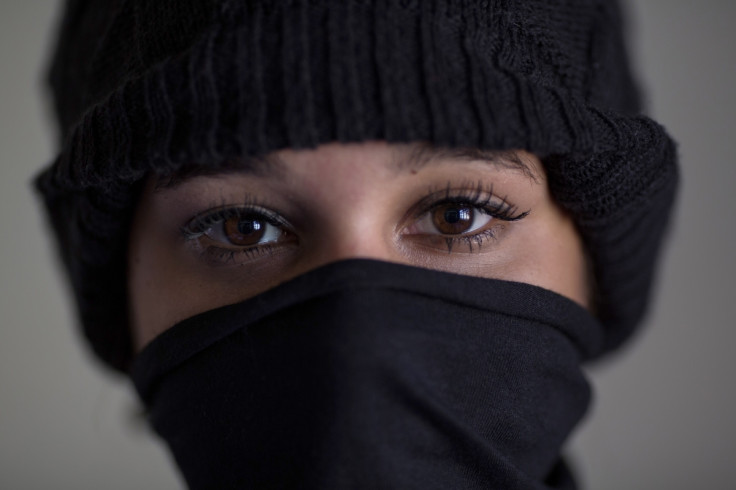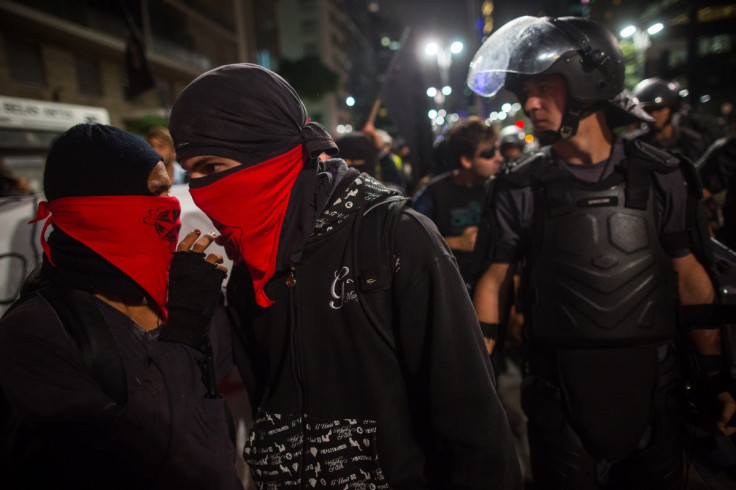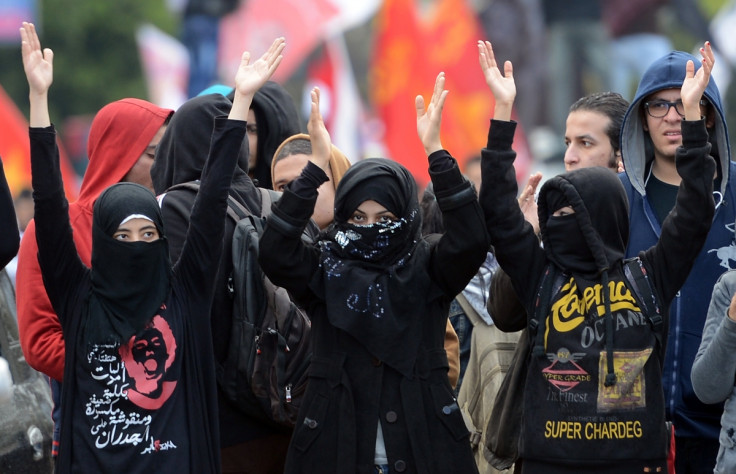Black Bloc: Who are the masked protest provocateurs?

The Grants Not Debt march against tuition fees in London on Wednesday (4 November) ended with 12 arrests and the usual images of black-clad Black Bloc members with their faces covered, scuffling with police. The line that the protest was mostly peaceful apart from "a small minority intent on causing disorder" has become police cliche.
Black Bloc is not any particular group, but instead a term used to describe a protest tactic whereby people come together, all in black, covering their faces to achieve anonymity, and partake in actions often considered anarchistic (read: violent and destructive). They are always a minority at any protest and are loathed and appreciated by peaceful protesters in equal measure.
Some see them as defending the movement or simply employing different tactics from other protesters. Others see them as toxifying the message and creating an easy excuse for police to clamp down on otherwise peaceful protests.
In their explanation of Black Blocs, the Occupy movement start off with two quotes to describe the divisiveness of Black Blocs:
"The Black Bloc always defend the demonstrations when the police come here." - Ariane Santos, 26-year-old Brazilian student.
"The Black Bloc anarchists, who have been active on the streets in Oakland and other cities, are the cancer of the Occupy movement." - Chris Hedges, American journalist and activist.

Origins of Black Blocs
Black Blocs originated in West Germany during the late 70s to early 80s as a response to local governments and police intensifying their actions against left-wing and anarchist groups in the country. The tactic spread further and has been used in the US and Canada, before moving on to places like the Brazil and the UK. They are more often part of left-wing and anarchist protests.
Black Bloc movements emerged in Egypt after the election of Mohammed Morsi. The main group said they were determined to continue the revolution by fighting "the fascist tyrants, the Muslim Brotherhood, and their military wing". The group were said to being engaging in terrorist activities and police were instructed to detain members. The leader of the Black Bloc in the country was reportedly arrested in June, 2015.
In Greece, Black Bloc groups have been part of several protest movements. One photographer in Lesvos told IBTimes UK that they often tell people they are there to help but end up being violent, "especially with journalists".
Black Blocs have been infiltrated by police in the past. Videos showing black-clad men getting out of police vans before protests against 2001's G8 summit in Genoa were widely shared at the time.
Some accuse Black Blocs of being sexist. Arguing that they continue an aggressive view of masculinity that puts off women from joining. Ex-members have told stories of women in the group generally being expected to go to the shops when more black cloth was needed.
In Montreal, a Black Bloc preparing for an upcoming march was said to be continuing gender stereotypes where "the men ended up in the backyard of an apartment honing their slingshot skills while the women were in the kitchen making Molotov cocktails"

Million Mask March 2015
Black Bloc tactics have started to show up in UK protests - notably in the 2011 student protests against tuition fees and the yearly Million Mask March, where protesters don Guy Fawkes masks and march on parliament, emulating the crescendo of 2006 film V For Vendetta. Once again, the masked march will be taking to the streets of London on Thursday (5 November).
Speaking to the Evening Standard, a police officer said that Wednesday's student protests were simply a dress rehearsal, and that more "hardcore" protesters would have stayed away, preparing for Thursday's march instead. "We're expecting trouble and for it to be nasty."
Police have said they are deploying thousands of extra officers and are putting restrictions on the event. Three static protests can take place at Trafalgar Square, Parliament Square and outside Downing Street. If a march takes place it can only be between Trafalgar Square and Whitehall.
Police have said that the protest "must not continue after 21:00hrs", though the Facebook event for the march has it ending at midnight. Police also stated that they will have "powers to require the removal of facial coverings where police anticipate there may be criminal offences".
The march is set to start at Trafalgar Square at 6pm, with other similar marches occurring around the world. Without a formal organisation it can be hard to predict numbers, though the Facebook event has over 18,000 people attending. A few will be Black Bloc - will they be described in Police statements tomorrow as "a small minority intent on causing disorder"?
© Copyright IBTimes 2025. All rights reserved.






















